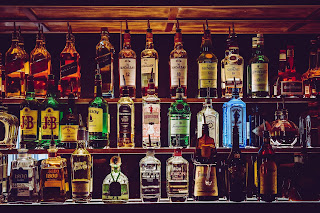It is difficult to know what to think about recommendations for Liquor consumption when the story around it changes like the wind.
Many studies have emerged in support of moderate liquor consumption because its potential health benefits can only be countered by similar studies, arguing that it is actually more harmful than beneficial.
And it's not conflicting research that makes decisions about liquor difficult; Other related factors, such as your age, gender, and health, may make the problem more complex.
So is it okay to have a glass or two of red wine with dinner? Or to enjoy some beer at the ballgame?
Here, we explain How Liquor Affects Your Body—both and —why not all liquor is created equal, and how to make the right choice for your personal health.
How much Liquor is too much?
Recommendations and guidelines set by the government and health agencies for Liquor Consumption are generally based on low to moderate intake. The U.S. here In, this means a greatest of one drink per day for women and two per day for men.
Recommendations for women are lower because their weight is generally lower, so they have less tissue to absorb liquor, and they have a smaller body structure with less water, so liquor is more common with men- Does not spread together. These factors make women more susceptible to the Effects of Liquor, and it takes fewer amounts to affect them.
Drinking is a bit difficult, but according to the guidelines, intake of more than 14 drinks per week for men and seven drinks per week for women is considered excessive.
Of course, these recommendations are based on the assumption that a person is quite healthy, with no inherent problems.
But many people have some kind of medical condition - or many conditions - especially as they get older. And your specific issues can make drinking more dangerous. For example, liquor has been identified as a common trigger for chronic conditions such as asthma and migraine.
Here are some other potential health benefits and risks:
Potential benefits of moderate drinking
Heart Brains. Some research has found that red wine improved heart health.
Some prospective studies have shown that patients who drink at least a moderate Amount of Liquor have a lower risk of coronary artery disease, but liquor should not be seen as an alternative to healthy behavior that increases risk. Proven to reduce. Such as eating right, exercising, and quitting Smoking.
Controlling Cholesterol. In some studies, moderate red wine consumption has been associated with increased levels of high-density lipoprotein (HDL) or good cholesterol, which may be helpful in preventing blood clots that reduce the risk of Heart Attack or stroke can do.
Beer can also help you manage your cholesterol. According to a recent study, moderate beer consumption may slow down HDL cholesterol deficiency over time.
Promote Bone Health. Studies published in the Journal of the American Medical Association and Osteoporosis International found that moderate beer drinkers were 38% less likely to have osteoporosis and a 20% lower risk of hip fracture than non-drinkers.
Too Much Liquor Risk
When liquor is consumed, but, the list of negatives surpasses any potential health benefits.
Cancer. Some cancers are associated with excessive liquor consumption. One, in particular, is hepatocellular cancer, which is liver cancer. Some esophageal cancers and gastrointestinal cancers are also related to Excessive Liquor consumption. And not cancer, but also liver disease.
Cause: Excessive liquor can damage cells in the body. When cells try to heal themselves, changes in DNA can occur which can lead to cancer and disease.
Diabetes. Liquor can influence glucose levels and interface with diabetes drugs. So for diabetics, drinking too much can lead to hypoglycemia, or "insulin shock," or hyperglycemia, an overdose of insulin (see below to learn more about why diabetics should drink with caution).
Heartbeat stoppage. While light or moderate liquor consumption may be good for your heart, excessive drinking weakens the heart muscle and can prevent blood from pumping. Thus, the consumption of liquor can cause serious cardiovascular conditions such as congestive heart failure.
Deteriorating health status among seniors. Although there have not been many studies on the effects of varying Amounts of Liquor use by seniors, Drinking Heavy Liquor can be harmful.
Excessive liquor damages brain cells and causes vitamin B1 (thiamine) deficiency, which can impair memory and vision. So it can cause worsening dementia.
According to the National Institute on Aging, liquor consumption can also worsen other health conditions such as mood disorder, osteoporosis, and high blood pressure, if sustained for a long time. And, of course, drinking too much can cause bones to break and break, which is always a concern for seniors.
What you drink makes a difference
How much liquor you are consuming is important, which can affect you in many ways depending on the following factors:
liquor content
National Institute on liquor Abuse and liquorism, a standard beverage in the United States contains roughly 14 grams of unadulterated liquor. Here's what a standard drink looks like for each type of liquor:
- 12 ounces of regular beer = about 5% liquor
- 5 ounces of wine = about 12% liquor
- 1.5 ounces distilled spirit = about 40% liquor
Calories (, carbs)
Apart from the amount of liquor, keep an eye on the calories you are drinking.
For example, beer has a high carbohydrate content, and some types of beer also have high calories. But most beers have a lower liquor percentage than wine or hard drinks, which usually leads to more drinking. And it can affect the body in many negative ways, such as weight gain.
Since carbohydrates are broken down in the body into simple sugars and absorbed into the bloodstream, drinking excessive amounts of beer can also affect your insulin levels, as mentioned earlier.
Too much beer can cause a drop in blood sugar levels because liquor prevents the liver from producing glucose. Although the liver can produce glucose if the blood sugar is too low, once these emergency stores are used, the excess of a person with type 1 diabetes cannot be made immediately after drinking too much. This thus can prompt low glucose levels. For people with type 2 diabetes, blood sugar levels rise, which can be dangerous.
So, if you have diabetes, you should not consume these carbohydrates too much.
what do you mix
Mixers enhance the taste of wine, but use them with caution. You don't think much about it, but many mixers add sugar and calories to your drink.
For example, 5 ounces of simple syrup - a common ingredient in mixed drinks - would add 45 calories. The five ounces of Cointreau found in Cosmos and Margaritas contain 47 calories. Those numbers may seem small, but they increase the total calories and sugar you consume, especially if you have more than one drink.
If you are diabetic or pre-diabetic, you should definitely avoid sweet mixers (and, for that matter, sweet wine or liqueur). To add flavor without sugar and calories, club pop, diet pop, or lemon or lime juice are keen decisions.
And although this is a popular trend, you should never mix liquor and energy drinks.
According to the Centers for Disease Control and Prevention (CDC), since energy drinks contain high amounts of caffeine, when they are added to liquor, they reduce the effects of liquor depression, so drinkers feel more alert. Huh. Because they feel more alert, liquor drinkers may believe that they are less affected by liquor and in turn consume more liquor. This increases their chances of being impaired and increases their risk for serious injury and risky behavior.
Make wise decisions about drinking liquor
At the end of the day, to determine whether Liquor is Good For You or Bad, you need to make sound decisions about your health.
If you do not have a health condition, then it is safe to say that following the guidelines of low to moderate intake should not cause any problems to your health - and may also be affected.
These are some remarkable exemptions, where it is suggested that you keep away from liquor inside and out:
- Those who have a history of liquor abuse in the family
- Pregnant and lactating women
- Women at risk of breast cancer
- Taking medicines that may interact with liquor
Always discuss with your health care provider whether it is safe to Drink Liquor to determine the best advice and the safest thing to do. This is definitely not something you should take a chance on if you are unsure.
Pregnant and lactating women should never drink. But according to a study published in the BMJ Open Journal in 2017, there has not been enough research to determine Whether Light Liquor intake can harm the baby in the uterus, or whether the "safe" level of liquor is a The woman can drink. during pregnancy. Thus the Center for Disease Control and Prevention recommends that pregnant women avoid drinking liquor altogether.




